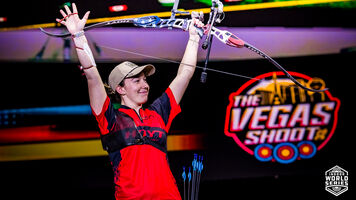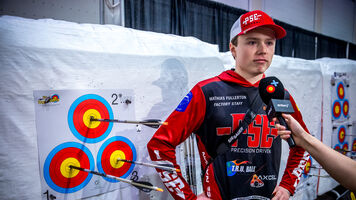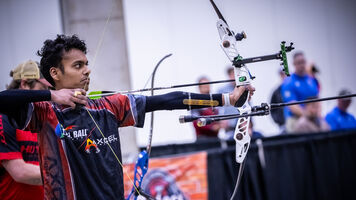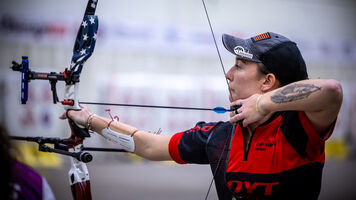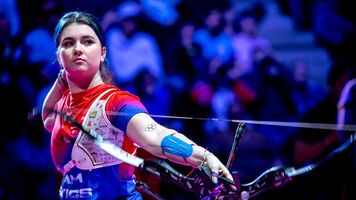Jung Dasomi and Korean women roll in Incheon recurve finals
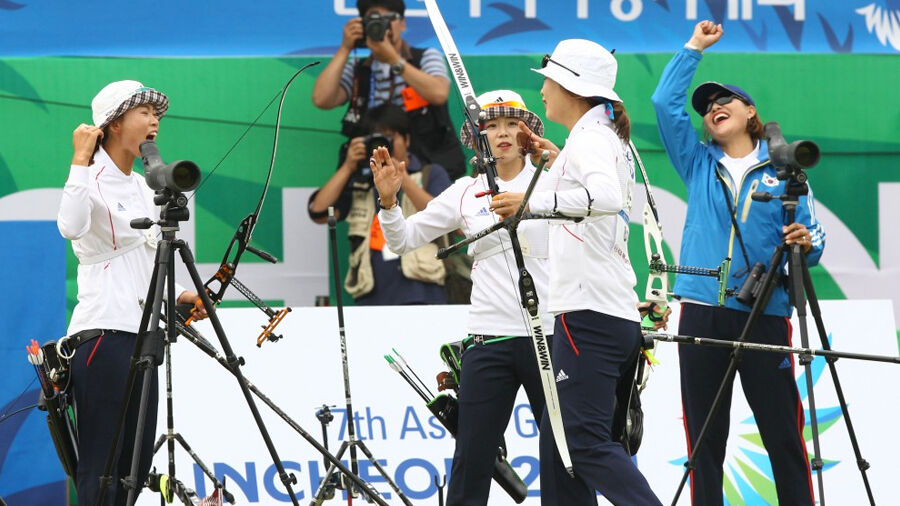
Header photo courtesy of the Incheon 2014 Asian Games website.
Jung Dasomi was perhaps best known for winning the London 2012 Olympic test event before failing to make the team for the Games the following year.
She officially dropped that moniker after cruising to the individual Asian Games title in Incheon. Dasomi’s week finished as well as it had started, after she posted the biggest score in recurve women’s qualification to claim the top seed ahead of Korean teammate Chang Hye Jin.
It would be the pair that met in the gold final.
They beat China’s Olympic team silver medallist Xu Jing and Hayakawa Ren from Japan in their respective semis – to set up a guaranteed Korean winner in the division.
Top seed Jung started with a 30, finished with a perfect 30 and only dropped a single point in each of the two sets in between. Final score: 7-1, two arrows in 12 out of the centre ring and it’s now Jung Dasomi, Incheon Champion.
Jing beat Ren to bronze. Jing was 3-1 down after two sets, then won three in a row.
It was something of a relief for China, after its recurve women failed to challenge Korea in the team final. With China only hitting the 10 twice in the three-set match, the home crowd in Incheon roared and the Korean women dropped to the ground when that coveted gold was secured.
Lee Tuk Young credited her “elder sister” Joo Hyun Jung, who had to drop out of the team event due to injury, as part of the team’s success because their “hearts beat as one”, according to The Infinite Curve.
In the men’s individual final, after falling 4-0 down to Yong Zhiwei – who is new on the international scene in 2014 and placed top 16 at the Wroclaw and Medellin World Cup stages this season – Olympic Champion Oh Jin Hyek rallied.
He shot a perfect 30 in the third, when he really needed it, before winning the back two sets by a point each to win the match.
It wasn’t completely convincing, though, and Oh seemed perturbed by his last shot. “I scored eight. I was fortunate to win gold,” he said, according to official Incheon blogger The Infinite Curve. No sway in confidence, though, from the 2013 World Cup Final Champion: “I will continue to do well.”
Oh’s recurve team looked demoralised when they lost in the semifinals to China earlier in the week.
The trio wrestled with Japan in the bronze final. The match was levelled at 3 set points apiece with one to go, when the Japanese let two eights drift in. Korea didn’t miss the gold in the 24-arrow win.
The Chinese team that beat Korea was clean and dominant in their final against Malaysia. Starting well and finishing better, a 57-57-58 series sank an opponent that shot too many eights and a six in the match’s 18 arrows to realistically contend the Asian Games title.
The Infinite Curve reported that individual silver medallist Yong said he hadn’t believed his team could win so fast in the final, while the Chinese team manager added his squad “showed no fear at all”.
Korea is known to have been targeting four to six out of the eight gold medals available in total at the Asian Games. (Up from four, with the inclusion of the compound competition.)
The nation ended the week with five Incheon titles. The total nine medals was five more than India – which collected all its silverware in the compound events – and China, which hasn’t yet shown any inclination of sending compound athletes to international events.
Eight Asian nations recorded a podium finish, joining the top three were: Iran, Chinese Taipei, Malaysia, Japan and the Philippines.






